The Least Important Person in the Room
“Don’t forget, you’re the least important person in the room,” was advice that Decca Mitford’s governess delivered her and her sisters in their storied childhood, which is not very fashionable guidance a century later from a psychological point of view. And yet it’s useful to me. Perhaps because I was fortunate enough to be brought up with love and support and self-esteem, the audacity enough to believe that I matter—which is audacity that sometimes needs to be tempered a bit.
I love the advice, “Don’t forget, you’re the least important person in the room,” because with it comes the freedom to do whatever the hell you want. Nobody’s watching. Nobody cares. Blogs, by their nature, are marginal, obscure. (Remember: “well-known blogger” is an oxymoron.) Blogs are different from the scrutiny of social media too, timelines unfolding in threads. Nope, it’s likely on your blog that nobody’s watching, and there is opportunity that comes with that. For you to worry less about what other people think, and it instead partake in an in-depth study of what you think. To try stuff out, to ask the questions you don’t quite know the answers to, to dare to (thoughtfully) be wrong about something.
And why not? No one’s watching. Which permits you to write with lack of self-consciousness that—paradoxically—will make readers actually be interested in what you have to say.
Don’t Build Your Digital Castle on Someone Else’s Land
Reserved Spaces for Writers of Colour
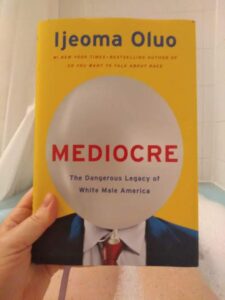
The foundation of my blogging courses are the gospels of imperfectionism, which is basically license to be human in public. And last night, while I was reading Ijeoma Oluo’s Mediocre: The Dangerous Legacy of White Male America, it dawned on me how much imperfectionism is a privilege that people of colour don’t always have access to. To be raw and unpolished in public, and still be taken seriously—that is white privilege (which is the very point of Oluo’s book).
And so what can I do to change this? How can I help create space in the world for people of colour to be free to be as flawed and sloppy and uninhibited as I am in my blogging life? One thing I can do right now is reserve one free space in each of my courses for writers of colour on a first-come-first-serve basis.
My next MAKE THE LEAP intensive course runs this February, and any writers of colour who are interested in taking part are encouraged to reach out to me using the “Keep in Touch” link at the top of the page.
Build a Blog
Deb Knows It
“I try to have a schedule, but I’m extremely bad at keeping schedules. I have watched corporate blog after corporate blog go to crap, because there was a posting schedule where you had to write five posts a day. I think that everybody would rather just write when you have something good to say.” —Deb Perelman
Blogs of the Year
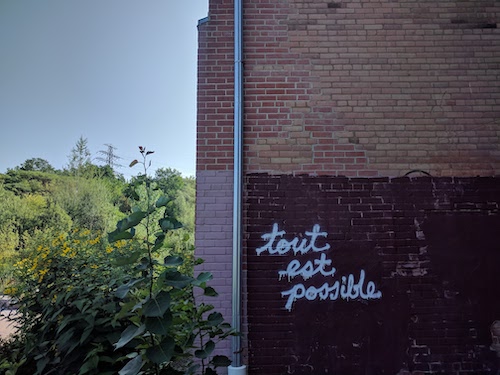
There are so many levels upon which the trajectory of 2020 has been full of unexpected diversions and strange surprises, most of them on such a grand scale that it’s easier to discount the little things. Like that I wasn’t sure where Blog School was heading as the year began. I launched Blog School in September 2019 with a self-guided course only, thinking that blogging itself is pretty solitary even IF the point is connection, and so a self-guided courses seemed to kind of make sense. (Maybe also I was lazy?)
But the people wanted more! And so I designed the MAKE THE LEAP program to run in February, my Blogging Spark course condensed into the shortest month. And an absolute DREAM TEAM of writers signed on to be part of it, and it was the best thing ever. I loved it. We had so much fun, and it was so inspiring, and I have never ever loved “work” so much. It wasn’t “work” at all.
I was planning to run the course again in June, but then the whole world went off its rails. Instead of a formal course, I decided put together more of a hang-out. LET’S GET TOGETHER ran in June, just as protests against police brutality and racial violence were taking place around the world, a harrowing and heady time, and it was a lot to process—but the bloggers in our group were doing it, putting the pieces together to make sense of it all, to write their way toward racial justice. It was inspiring and amazing.
And then a small group signed on for another MAKE THE LEAP session in September, and I loved this group just as much—who would have thought it possible? Another fabulous group of writers whose central feedback required was just mainly me shouting, “Yes! Yes! This EXACTLY!! Keep doing it!” It was really, really good.
Some of the blogs that were born or developed out of all this:
- Topaz Literary
- A New Tea Leaf
- Becoming Janine
- DeRollerCoaster
- The Wilderness of This
- Loving a Spouse Who is Living with Dementia
- Beyond Word Count
- Littlewood Art
- Lisa Bradburn at Medium
- Julie Paul’s Blog
- Rhonda Douglas’s Blog
There are more, but I particularly wanted to highlight those which have been updated in the last month or so, those whose writers have discovered the key to blogging success, which is DON’T STOP DOING IT!
Thank you to everybody who has played a part along the way—those of you who read blogs, who’ve participated in my courses, those of you who keep writing, all of you affirming that the future of blogging (still!) is RIGHT NOW.
MAKE THE LEAP is running next in February 2021, and registrations are beginning to come in! Sign up today to claim your spot (and a reminder that three two left! discount spaces are reserved for people who have signed up for my self-guided course already).
A Good Thing
“What if the freedom and curiosity and occasional exhilaration I experience when I’m writing on my blog, for that matter, is also about finding my own way, using the tools that feel natural in my hands, making this site a self-portrait in words rather than a shelter from the uncongenial demands of “real” academic writing? What if feeling some comfort, pleasure, and ease in a particular kind of work means that it fits, and that’s a good thing?”
Julia Zarankin: From Birder, to Blogger, to Book!
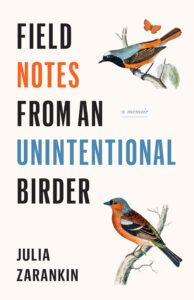
A highlight of my Fall so far has been celebrating the launch of my friend Julia Zarankin’s memoir Field Notes From An Unintentional Birder, a book I’ve been waiting to get my hands on—and it lived up to all my expectations.
In this Q&A, Julia talks about how blogging is like birding, how blogging became part of her process as a birder and a writer—and also about what happened when her blog disappeared.
Kerry: As someone who thinks about blogging a lot, I kept seeing parallels between blogging and birding as I read your book, how they teach similar lessons. As someone who has done both, what’s your take?
Julia Zarankin: More than anything, birding has taught me to see in a new way. So much of birding revolves around being attuned to the present moment and to really open your eyes to what’s in front of you, and really focus on detail. In a sense, blogging is also very much about connecting with specific moments of your daily life. To me, both are a form of active engagement with whatever it is you’re passionate about. I see birding and blogging as an antidote to despair, because when you’re looking closely and finding beauty in the ordinary, you’re bound to see the world with a little more brightness & potential.
“I see birding and blogging as an antidote to despair.”
Kerry: What role has blogging played in the journey to FIELD NOTES?
JZ: I started blogging shortly after I started birding. Everything about birding felt so strange and foreign and wonderful to me, and I wanted to understand it better and process it. So I started writing a blog called BIRDS AND WORDS to make sense of this new (somewhat strange) hobby of mine. My blog provided me with the ideal (and very low stakes) places to test out my ideas. Initially my blog was all about the frustration of being a beginner birder (and getting most things wrong), but slowly it evolved into something deeper, where I was seeing connections between birds and the rest of my life (and intellectual interests). I think it’s safe to say that I wouldn’t have had the confidence to write FIELD NOTES had I not tested out some of the ideas on my blog. Also, I realized, while experimenting on my blog, that writing about birds didn’t have to be 100% serious.
Kerry: What were your initial challenges as a blogger, in particular as someone trained in academia?
JZ: It took a while to let go of the idea that the words that appeared on my blog had to be polished gems of perfect prose. I remember writing and rewriting my first blog posts until I felt I’d gotten them just right. And then for days afterwards, I obsessed over my analytics and cried when I saw that no matter how hard I worked on perfecting my blog posts, they were still only read by 7 people in Mumbai.
(For a while this made me cry and I gave up on my blog several times—what’s the point?—but I couldn’t quite let it go; something about it still made me smile, and I knew the posts I was writing, while imperfect and with the occasional spelling/grammar glitch, had an energy to them, and I kept coming back to the blog, no longer for those 7 mystery people who were likely bots, but for myself.)
And in a way that realization that nobody read my blog freed me up to experiment more, to toss my ideas of perfectionism to the side and just write things FOR MYSELF in a way that engaged me. Since nobody was reading, I could just be myself, right? Kerry’s mantra, BLOG LIKE NOBODY’S READING, is the wisest thing I’ve had to learn for myself (over and over again). And when I stopped trying to make my blog posts perfect, they were also a lot more fun to write!
True story: I actually used my blog posts as writing samples for a blogging gig (paid!) I had at Ontario Nature for a number of years.
“And in a way that realization that nobody read my blog freed me up to experiment more, to toss my ideas of perfectionism to the side and just write things FOR MYSELF in a way that engaged me.”
Kerry: What helped you make blogging into a habit?
JZ: Initially, I began with the goal of writing three posts/week, but as things got busier, I transitioned to writing one post/week.
Kerry: Blogs don’t have to be forever—they’re a moment in time. Your blog was lost in some website SNAFU a few years ago, right? (HOT TIP: Blog at your own domain and back up your stuff!)
How did you make peace with your blogging life ending in such a way?
JZ: Three years ago, my blog disappeared. It vanished from the earth along with its platform. But the funny thing is that it all ended just as I was beginning to work on my book in earnest, and actually conceive of it as a book with a narrative arc and not just a collection of fragments. So in a sense, the blog had served its purpose and it was a sign for me that it was time to say goodbye to it and apply the lessons I’d learned—and especially the energy with which I’d started to write—to a larger project. I always saw my blog as a (very low stakes) place where I could test out my ideas and have fun with writing.
Thank you, Julia! I love this book. It’s available now where all good books are sold—and I think any blogger will find a lot to appreciate in its pages.
Betty Cooper Was a Blogger
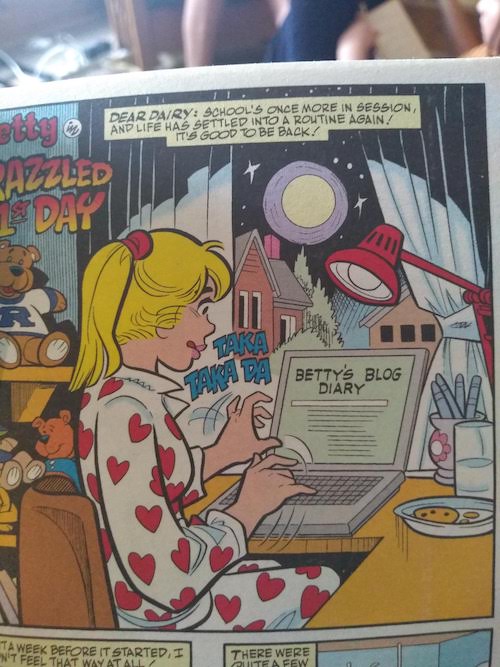
“Dear Dairy,” though. She wouldn’t be the first one to make that mistake…
How Long Should a Blog Post Be?
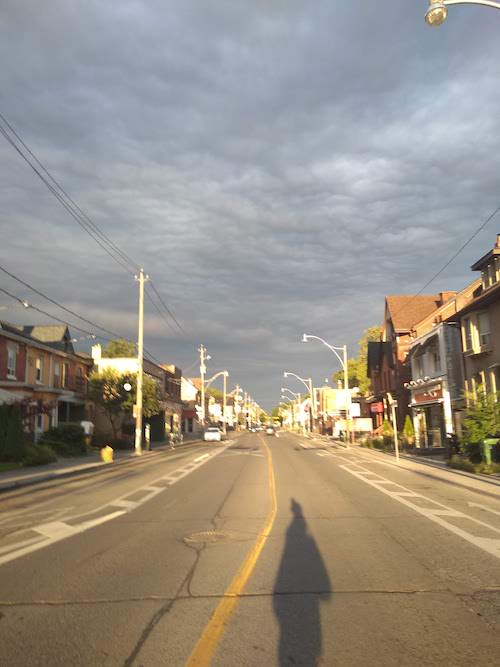
Blogging can be tough for somebody who always likes to have all the answers, for there to be direct guidance, regulations, and specifications. “How long should a blog post be?” is a question that novice bloggers worry about a lot, and my immediate answer is really not especially helpful:
You’ll know how long your blog post should be when you’ve got to the end.
In blogging, I think you’ve got to write your ways to the answers of questions like these, because the answers are going to be different for everyone. The answers are even going to be different for you depending on what you’re writing about, how much time you have to write your post, whether you’re in a particularly introspective mood or otherwise. You’re going to write posts that you realize were too long or too short based on reader feedback, but this is great, because doing it is how we learn.
That said, there are some telltale signs that your posts may be going on too long. And while I love meandering posts that take the reader from one place to another, I often encounter posts that really could be broken up into a few separate posts, and perhaps they should be broken up into separate posts, because doing so would be less work for the writer, it makes it easier for a reader to grasp what the writer is expressing, and it’s useful for SEO purposes.
(I am mostly talking about the kinds of posts that are didactic, trying to reach a reader directly with titles like “How Long Should a Blog Post Be?” or “Signs Your Blog Post Might Have Gone on Too Long.” More personal, cerebral blog posts don’t really apply in this context, though some of the advice might still be useful.)
So yes: SIGNS YOUR BLOG POST MIGHT HAVE GONE ON TOO LONG.
- You have divided up your post with subject headings. This is a writing habit of academics in particular that is really hard to shake, but in general, if you’re introducing a new subject heading, you should really be just writing a new blog post.
- You have included more than one list in the content of your post. Also another sign that you’ve actually written two posts in one.
- Your intro that is so long, the reader has to scroll down to get past it. In blogging, getting to the point is essential. If you’ve written a long intro to your post, ask yourself if it’s necessary. What would your post lose if the intro wasn’t there?
- You’ve included a sentence like, “But back to my original point…” Now, there is nothing wrong with digressions in blogging. Blogging is the original digression, to be honest! But such digressions should lead somewhere rich and rewarding that open up onto someplace new for you and your reader. When digressions work, they become the destination. But if you’re just leading your reader off the path and back again, it’s possible the digression itself is its own post.
- The post took you hours and hours to write. Because this is not sustainable, unless you’ve got a blog that pays you by those hours (and lucky you!). Aim for a post you can write in an hour or two. The blog itself is meant to be raw and unpolished, and you’ll have far more continued success as a blogger if you figure out how to do it efficiently.
And what do I mean by “continued success as a blogger”?
I mean that you’re going to be a blogger who actually blogs!
******
Blog School turns 1 this month! Thank you to everyone who has made my small business a success—and to all the bloggers who’ve been part of it, creating successful blog posts of their own! My September session of MAKE THE LEAP is up and running, and will be offered next in the new year. The self-guided version FIND YOUR BLOGGING SPARK is ready to start whenever you are. And make sure you’re signed up to my newsletter, because you don’t want to miss a thing.

